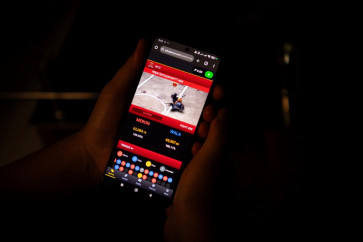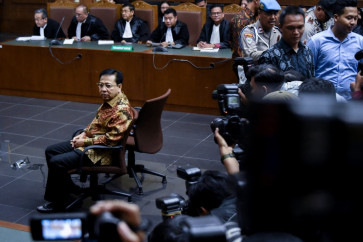Popular Reads
Top Results
Can't find what you're looking for?
View all search resultsPopular Reads
Top Results
Can't find what you're looking for?
View all search resultsNU, MUI dissent on marriage law petition
Four religious-based groups gave mixed responses during the hearing of a judicial review case challenging the Marriage Law at the Constitutional Court (MK) on Wednesday
Change text size
Gift Premium Articles
to Anyone
F
our religious-based groups gave mixed responses during the hearing of a judicial review case challenging the Marriage Law at the Constitutional Court (MK) on Wednesday.
The Indonesian Ulema Council (MUI) and the country's largest Muslim organization, Nahdlatul Ulama (NU), disagreed with the petitioners and told the court to reject the judicial review request, while the Indonesian Communion of Churches (PGI) presented arguments siding with the petitioner. Meanwhile, the Council of Buddhist Communities (Walubi) refused to provide the court arguments on the legality of a marriage.
The judicial review was filed by three graduates and one student from the University of Indonesia who demanded the court give a new interpretation on Article 2, which defines a marriage as legitimate only if it is conducted according to the religious teachings of the bride and groom.
Luthfie Hakim from the MUI told the court that without the disputed article, there would no longer be a religious aspect in marriage, saying that the petitioners were trying to set aside religious ceremony.
'Our sociocultural reality is very different from those countries that uphold human rights as freely as possible,' he said.
Representing the NU, Ahmad Isomuddin argued that Islam did not recognize interfaith marriage.
'Islam declares interfaith marriage cannot happen,' Ahmad said, adding that Muslim women should only marry Muslim men.
The PGI said that the article was ignoring the reality of citizens in Indonesia who appreciated the Bhinneka Tunggal Ika spirit, or unity in diversity, and multiculturalism, as well as human rights.
'This article ignores the fact that humans have a sense of universal love, regardless of color, ethnicity or religion,' PGI's Nikson Gans Lalu said. 'Although an interfaith marriage is not ideal, a marriage between people of different ethnicity and religion is not impossible and occurs in society.'
'The article maintains spiritual purity, but, at the same time, it also creates potential misappropriations in moral and spiritual terms because the civil registry office refuses to marry people,' Nikson added.
In the meantime, Walubi refused to give its view on the legality of a marriage during Wednesday's hearing session, only commenting on the Buddhist perspective regarding morals, marriage and religious freedom.
'Buddha said two humans can get married due to a strong and deep affinity in the past,' Suhadi Sendjaja from Walubi told the court. '[And] in terms of religious freedom, Buddhism actually states it does not easily accept people from other religions to join Buddhism, although people may practice Dharma [the teachings of Buddha] in their daily life.'










